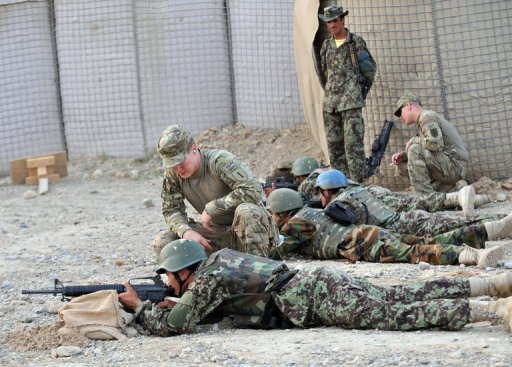
From Aymeric Vincenot, AFP: Grave doubts over the ability of Afghanistan’s fledgling security forces to beat back the Taliban are weighing on a transition from NATO control taking place in seven parts of the country this week.
With foreign troops starting to leave ahead of a full combat drawdown by 2015, the spotlight is keenly focused on building up the national army and police forces, which officials say are rapidly improving in quality and number. But experts say worrying problems persist, with high levels of attrition and illiteracy, cronyism and fears of infiltration by insurgents within the ranks.
The United States alone has spent $27.8 billion on their development since 2002 and Western officials in Kabul predict it could be up to a decade before Afghanistan can pay for its own defence. But as foreign aid starts to recede, there are fears over how the Afghan forces will be funded.
A Pentagon war report in April said a shortage of 700 international trainers was also hampering efforts. It said that about three-quarters of army units are judged "effective" when backed by advisers or assistance from coalition troops, but not one army or police unit is deemed able to operate independently.
[…]
But critics say overtures being made to the Taliban, as Afghan President Hamid Karzai and the United States seek a peaceful exit to 10 years of war, are damaging morale among troops who don’t know whether to fight or make friends. "Like when the government, especially Karzai, calls the Taliban ‘brothers’. How can the army or police shoot them, when they think they are our brothers?" said deputy speaker of parliament, Ahmad Behzad, a vocal government critic.
Fears of Taliban infiltration have also risen in conjunction with a number of high-profile attacks carried out by men in police and army uniforms.
The increased threat has forced the American military to announce it will send 80 counter-intelligence agents to help better screen recruits.
Overall, the beginning of a drawdown coupled with the start of transition does not match the reality on the ground, said Gilles Dorronsoro, an Afghan expert at the Washington-based Carnegie Endowment for International Peace. "It’s an artificial calendar which doesn’t match anything on the ground. It’s too early because the ANA are not ready and too late because the withdrawal has started." And he warned that if Karzai does push through a political settlement with the Taliban, rival warlords, who control their own factions within the ANA, may simply find it unacceptable and withdraw support for the government. "There’s a risk of implosion in the Afghan army," he said. "If the strongmen in the north don’t accept negotiations, they could leave the government and take their men with them."
Photo: Ted Aljibe/AFP
Image: afghanistan-training.jpg
